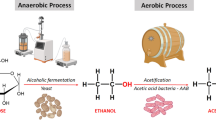Abstract
AN investigation was started in December 1954 into the storage qualities of groundwood pulp impregnated with 25–35 p.p.m. of phenyl mercuric acetate, compared with unimpregnated pulp made at the same time. One object of this work was to follow the course of infection of the pulps by blueing and wood-rotting fungi (Basidiomycetes), the latter frequently being responsible for the condition known as ‘red-rot’, and also to try to discover why phenyl mercuric acetate, although toxic to many Basidio-mycetes at low concentrations, frequently fails to protect ground wood pulp from attack by ‘red-rot’ after a few months storage. Some significant conclusions have now been reached.
This is a preview of subscription content, access via your institution
Access options
Subscribe to this journal
Receive 51 print issues and online access
$199.00 per year
only $3.90 per issue
Buy this article
- Purchase on Springer Link
- Instant access to full article PDF
Prices may be subject to local taxes which are calculated during checkout
Similar content being viewed by others
References
Appling, Buckman and Meals, Tappi, 32, No. 7 (July 1949).
Appling, Buckman and Cash, Tappi, 33, No. 7 (July 1950).
Pehrson and Petterson, Svensk. Papp. Tidn., 21, 801 (1954).
Author information
Authors and Affiliations
Rights and permissions
About this article
Cite this article
RUSSELL, P. Inactivation of Phenyl Mercuric Acetate in Groudwood Pulp by a Mercury-resistant Strain of Penicillium roqueforti Thom. Nature 176, 1123–1124 (1955). https://doi.org/10.1038/1761123b0
Issue Date:
DOI: https://doi.org/10.1038/1761123b0
This article is cited by
-
Mechanisms of copper tolerance in the marine fouling alga Ectocarpus siliculosus ? Evidence for an exclusion mechanism
Marine Biology (1979)
-
Stimulative Vaporization of Phenyl-mercuric Acetate by Mercury-resistant Bacteria
Nature (1968)
-
A Selective Medium for the Isolation of Basidiomycetes
Nature (1956)
Comments
By submitting a comment you agree to abide by our Terms and Community Guidelines. If you find something abusive or that does not comply with our terms or guidelines please flag it as inappropriate.



